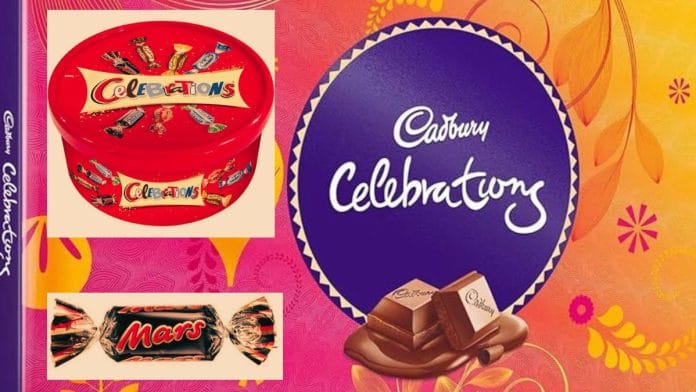New Delhi: In the late 1990s, Mars Incorporated and Cadbury India Limited independently launched their chocolate gift assortments under the brand name ‘celebrations’. What began as parallel marketing efforts soon escalated into a drawn-out legal contest, as each company claimed exclusive rights to the word and its stylisation across product categories.
Nearly 25 years of courtroom sparring later, the two confectionery titans finally chose peace over rivalry in a settlement earlier this festive month—a rare conclusion of one of India’s longest-running trademark disputes.
Justice Sanjeev Narula of the Delhi High Court has approved a settlement reached by both parties, concluding the lawsuit. His order not only closed all pending litigations but also turned what had once been a battle over branding into a celebration of goodwill.
According to the seven-page court order, Mars agreed to withdraw its pending lawsuit and two opposition proceedings filed against Cadbury’s applications for ‘celebrations’ and ‘Cadbury celebrations’ in Class 30. Similarly, Cadbury India also withdrew its opposition and rectification proceedings against Mars’s trademark registrations and applications. Legally, both brands—Mars and Cadbury—can now use the term ‘celebrations’ in their own way.
How the case concluded
Earlier this month, Justice Sanjeev Narula acknowledged the unusual emotional symbolism in the case through his observation that legal wrangling had long marred a word associated with joy.
“An expression of happiness and festivity became the epicentre of legal contest, its cheerful ring turning into a matter of serious deliberation for decades, winding through pleadings, affidavits, and hearings,” Justice Narula said. “Today, that long journey finds its conclusion. The curtains are drawn, at last, not in discord, but in harmony.”
“By choosing an amicable resolution, these two reputed companies, once adversaries, have together restored the plain sense of the trademark they long contested—‘celebrations’ now denotes joy that is shared and not divided,” he added.
Over the decades, the case spanned multiple forums, including the Trade Marks Registry and international jurisdictions, with both sides filing numerous opposition and rectification petitions.
The settlement, dated 3 July 2025, was filed under Order XXIII Rule 3, read with Section 151 Civil Procedure Code—provisions that empower a court to record a lawful compromise between parties and pass a decree in its terms. Once recorded, such settlements become binding and final, provided they are voluntary and not contrary to public policy.
Clarifying that the court’s role was to ensure that the agreement was lawful and equitable, Justice Narula noted that “the court views this closure with satisfaction”.
Also Read: India’s Supreme Court is a decorated superstructure with a dilapidated base
How the end was sweetened
The settlement came wrapped in a gesture befitting the season. Afterwards, both Mars and Cadbury voluntarily proposed to distribute Rs 5 lakh worth of confectionery each to children in government and government-aided schools across Delhi-NCR ahead of Diwali.
This act, they told the Delhi High Court, “would symbolise goodwill, community, and the joy of giving, a spirit that transcends commercial rivalry”. The HC recorded its appreciation for this gesture, “which reflects that even in fiercely competitive industries, corporate rivalry need not eclipse social responsibility”.
“True celebration lies not in triumph over another, but in generosity towards others,” Justice Narula said.
The Delhi State Legal Services Authority (DSLSA) and the Directorate of Education, Government of NCT Delhi, supervised the drive, ensuring that all distributed products complied with Food Safety and Standards Authority of India (FSSAI) standards and remained within their shelf life.
Acknowledging possible health concerns, the HC included a safeguard: “Should any school or authority consider the proposed distribution inconsistent with such guidelines, the parties shall, in consultation with the Directorate of Education and the DSLSA, offer nutritionally balanced or wholesome alternatives of equivalent value… this safeguard preserves both the spirit of generosity embodied in the parties’ gesture and the equally important aim of promoting healthy habits among schoolchildren.”
The Delhi High Court also directed both companies to file compliance affidavits after completing their initiative.
Justice Narula’s closing remarks encapsulated both the spirit of the festival and the legal finality of the matter: “…it is a reminder that even the most protracted disputes can find resolution when goodwill prevails. The true value of this case lies not in the volume of pleadings or arguments, but in the conduct of the parties at its close.”
What the settlement means
Speaking to ThePrint, advocate Hemant Singh, a veteran intellectual property rights (IPR) lawyer with over 40 years of practice, explained that the settlement was a pragmatic choice, rather than a legal precedent.
“Such amicable settlements happen when parties are no longer interested in litigating, incurring further costs, or pursuing issues that may have lost commercial significance over time,” he said.
Hemant Singh, also the President of AIPPI (India Group)—International Association for the Protection of Intellectual Property—clarified that since this was a compromise and not an adjudicated decision, it holds no precedential value on the question of what constitutes proprietorship over common or descriptive marks.
“It’s essentially a closure, not a declaration of rights, but an understanding between two long-time rivals that the issue doesn’t need to be fought anymore,” he added.
(Edited by Madhurita Goswami)
Also Read: India’s Supreme Court is a decorated superstructure with a dilapidated base






